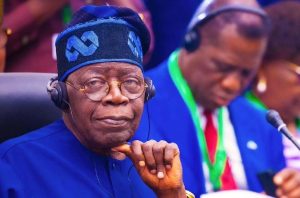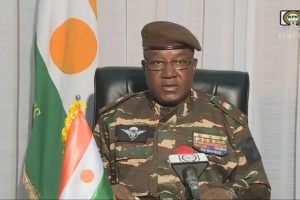
Tony Iju Nwabunike, Pioneer Chairman of the Council for the Regulation of Freight Forwarding in Nigeria (CRFFN)7has said that the Niger space is the largest in West Africa and very strategic in the economic interdependence of African countries. He opines that although the improved relationship with France looks good but as a growing economy, Nigeria needs Niger, more than she needs France.
In a recent paper presentation in Lagos, Nwabunike, who is also a maritime expert said the Niger being the largest country in West Africa by land mass, is influential in ECOWAS and strategic for the success of the African Continental Free Trade Area (AfCFTA) agreement in addition to being richly endowed with natural resources
He stated that Nigeria’s relationship with Niger republic over time has contributed immensely to the economy of both nations as they share a long history of cooperation and collaboration. Since independence in 1960, the two states pursued close relations. Each side has based diplomatic relations upon non-interference in the internal affairs of the other.

Each nation plays active roles in continental multilateral organizations and are members of the Economic Community of West African States (ECOWAS) trade bloc, the African Union, African Development Bank, UEMOA, CILSS, Council of Understanding, and the ALG. Bilaterally, the two nations formed the Nigeria-Niger Joint Commission for Cooperation (NNJC), established in March, 1971 with its Permanent Secretariat in Niamey, Niger.

The Niger–Nigeria border is 1,608 kilometres (999 miles) in length and runs from the tripoint with Benin in the west to the tripoint with Chad in the east which makes Niger republic larger than Nigeria, Five of Niger’s eight regions — Zinder, Tahoua, Maradi, Dosso and Diffa — all border Nigeria, a major trading partner for Niamey.
The border is around 1,600 kilometers (994 miles) long, and Nigeria had long supplied Niger with electricity, tobacco and building materials like cement. Agricultural products like dates and cattle flowed in the opposite direction.In 2022, data from the International Trade Centre (ITC) showed that cross-border trade between Nigeria and Niger was worth roughly $226 million ($209 million).
Analyzing the bilateral relations between Nigeria and France through the lens of patron-client relations valuable insights into the dynamics of their interactions. The relationship can provide benefits, such as economic support and political backing, and it i’s essential to be aware of the potential risks of dependency and to strive for a more balanced and equitable relationship.
President Bola Ahmed Tinubu making history on December 2, 2024, with a three-day state visit to France, marking the first time a Nigerian leader has visited France in over two decades. The visit aimed to boost economic cooperation between Nigeria and France.
During the visit, Nigeria and France signed two landmark agreements, including a €300 million deal to support multi-sectoral growth in Nigeria . This pact focuses on developing critical infrastructure, renewable energy, transportation, agriculture, security, and healthcare in Nigeria.
According to Nwabunike, addressing geopolitical concerns presently, Nigeria is not having the best of political relationship with Niger, which has the largest land space measuring 1.267million square kilometers bigger than Nigeria’s 923.7million square kilometers.
The Niger space is the largest in West Africa and very strategic in the economic interdependence of African countries. Our improved relationship with with France looks good but as a growing economy, we need Niger, more than we need France.
He pointed that our proximity to Mali and Algeria through Niger is a great advantage to explore in reaching our North African brothers as over ten thousand trucks carrying trade goods to and from Nigeria travel along this route annually, all things being equal.
The Trans-Saharan Gas Pipeline is a project that would connect Nigeria’s Warri gas fields to Europe via Algeria which must pass through Niger Republic. It was planned to run from Nigeria’s Warri region through Niger to Algeria’s and would connect to existing pipelines that supply Europe from Algeria’s Mediterranean coast.
The pipeline would be 4,128 kilometers (2,565 miles) long, with 1,037 kilometers (644 miles) in Nigeria, 841 kilometers (523 miles) in Niger, and 2,310 kilometers (1,440 miles) in Algeria. The pipeline would deliver up to 30 billion cubic meters of gas per year and estimated to cost $13 billion. The pipeline is expected to begin operations by 2030.
He noted that the recent commencement of trade by some companies under the AfCFTA Guided Trade Initiative (GTI) has undoubtedly been encouraging. Nigeria’s participation in the African Continental Free Trade Area (AfCFTA), is showing brighter prospects that could be further illuminated by developing our trade policy thrust.
” We are the single largest market in Africa with an influential population of about 223m people only followed by a distant second Ethiopia; third, Egypt and fourth Democratic Republic of Congo with 126m , 112m and 102m persons respectively.
” We are growing our export but not at a commensurate measure with our high import volume whereas Nigeria has what it takes to become the China of Africa in terms of production.
” Today, some African countries are taking the bull by the horns, working hard to break new grounds in political,economic and social development. Being part of the single largest market in the world where we ought to have influential participation is an opportunity lying on our laps.
” We must as a country be ready to take the opportunity offered to us before Nigerians become backbenchers in a system we ought to be frontrunner. The AfCFTA has 54 signatories, making it the largest free trade area in terms of the number of member states, second only to the World Trade Organization. It is also the largest in population and size serving over 1.3 billion people across the African continent.
Speaking further, Nwabunike explained that presently, there is no smart border in Nigeria and according to the International Office of Migration, (IOM) statistics has shown that Nigeria has 86 official land borders control post.
” The number of approved international border points in Nigeria is around 364, with about 261 in the north-east and north-west regions. This proves that our pace at modernisation of borders which are critical migration and trade gateway has been very slow. Trans border traders need their confidence rebuilt by the Nigerian state whose duty is to ensure the group and other illegal armed groups along our border corridors cease to exist.
“Yes, they shouldn’t exist at all, if we are serious about trans border trade and we want the economy to grow. It’s important the federal government establish good presence at the border communities to avoid such group cashing in on the vacuum. If trans border traders under AfCFTA begin to avoid certain routes for safety reasons, other areas being used would likely be burdened by too many traffic and the cost of logistics becomes higher leading to inflation.
Speaking on insecurity at borders, he stated that the Nigerian government through its armed forces has been making efforts at fighting insecurity even at border areas but recent happenings shows that these challenges are far from over.
” In November 2024 , we read in the news about the creation of a new terrorist group called Lakurawa operating in northern states bordering Niger Republic. The Lakurawa group, affiliated with terrorists in the Sahel, particularly from Mali and Niger Republic, became a national security challenge after work launching its first audacious attack on November 4.
” Found in Illela, Gudu, Tangaza, and Gada , among others, the group stay in borders with either the Niger Republic or other states and have reportedly established presence in Sokoto, Kebbi and Zamfara. This new group is said to operate at border states and towns which is a direct threat to trade and social stability in the affected areas where non state actors have shown tendencies to unlawfully bear arms, impose taxation and disrupt lawful governance system.
” We read that government is taking action against the group with collaboration of troops from Niger and Chad. We expect a permanent solution”
The Mac Tonnel Ltd Chairman emphasised that beyond rhetorics, the Nigerian Ports Authority (NPA) should dedicate more space for exports and work towards reviving moribund legacy ports like Burutu, Sapele (presently being used by Nigerian Navy for engineering) ,Koko Port and Calabar Port as these maritime infrastructures are relevant for today’s Nigeria and could serve the larger interests of Nigerians and Africans using the maritime space to trade under the AfCFTA regime.
” Being big and having the opportunity to take advantage of our size and endowments are a different game from stepping forward to maximise it when the opportunity comes. We have the potential to become the biggest beneficiary country in AfCFTA if we get electricity right for industrialisation with safer fields for our farmers and trans border traders.”











